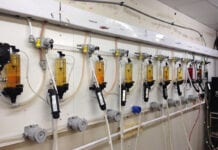Perfect pints are more important than ever before, specialists say

The quality of the liquid pouring from a venue’s taps sets the standard for the rest of the operation. And in 2019, with consumers increasingly searching for a premium experience in the on-trade, the need for a comprehensive cellar management system cannot be overstated.
That was the message from specialists, who stressed the correlation between best practice and the pouring of consistently good quality pints.
Stevie Dickson, dispense quality manager at Tennent’s Lager, said: “It is completely understandable that consumers have high expectations of what they are seeking from a quality pint.
“Therefore, it’s important that operators ensure high front and back of house standards to keep consumers happy and ensure they are pouring pints at the best possible standard.
“Consumers will keep coming back to an outlet that they can trust will deliver consistent quality.”
Dougie Stoddart, commercial director at Cellar Cooling manufacturer, Hubbard Products, agreed and said operators need to remember the value of the stock beneath the bar – and therefore the importance of keeping it in optimum condition.
“With so much capital tied up in cellar stock, it is important to think through the long-term financial consequences of maintaining that stock in a saleable condition,” he said.
“While most licensees assume a cellar either above or below ground will automatically be a cool place, nothing could be further from the truth.”
It’s important to consider the long-term conditions of maintaining stock in a saleable condition.
Richard Cooper of Clear Brew said that, when it comes to cleaning beer lines, the right routine is critical.
He said: “Line cleaning is all about maintaining quality and not about cleaning lines because they are dirty.
“Cask lines should be flushed with fresh, cold water between each cask, tapped and vented correctly and served three to four days maximum.”
Hance McGhie of Chemisphere warned against cutting corners in the cellar, urging operators instead to equip staff with the right knowledge and tools to do the job.
“Invest time and a small amount of money in line cleaner, regularly clean the cellar, keep it tidy and keep up with maintenance,” he said.
However, the quality of cleaning product utilised is also an important consideration, according to McGhie.
“You can buy cheap from a cash and carry, but you will pay the consequences,” said McGhie, who stressed that cleaning couplers and nozzles is “equally as important and using the correct solution is also crucial”.
“Putting nozzles in fizzy water is pointless and will harbour bacteria,” he said.
And licensees have been advised to prioritise good quality food grade gas in their dispense systems to help deliver a “superior product”, according to a spokeswoman for gas firm Air Products.
She added: “One cylinder of bad dispense gas can ruin up to ten kegs of beer.”
Top cellar management tips
Proper cellar temperature, 11 to 13 degrees, should remain constant as kegs and casks can take up to two days to adjust. If a cellar is too warm, beer will fob; too cold, beer can go flat and there is a rise of haze in both keg and cask.
Have set opening and closing procedures. Turn off all dispense gases at close of play; this reduces risk, saves potential overnight leaks and helps by reducing potential over-carbonation of slow selling keg products.
Cleanliness of the lines and connectors; this should always be done on a regular day and line cleaning should be carried out when stock levels are at their lowest.
– Clear Brew






















